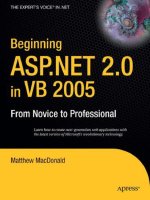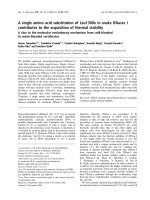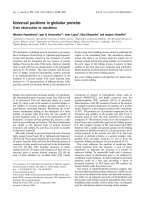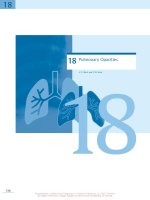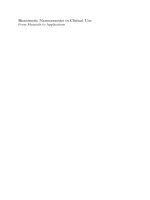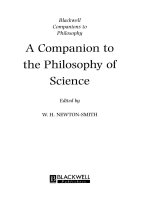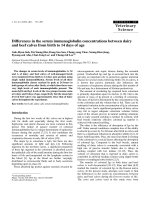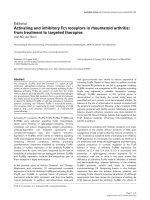Explorations in economic methodology from lakatos to empirical philosophy of science
Bạn đang xem bản rút gọn của tài liệu. Xem và tải ngay bản đầy đủ của tài liệu tại đây (863.56 KB, 256 trang )
Explorations in economic methodology
Economics is an established academic discipline, yet its methods and style of
argumentation are far from being well understood. In recent years attempts have
been made to understand economics through applying ideas from the philosophy
of science (especially from the writings of Popper, Kuhn and Lakatos) and through
the study of economists’ rhetoric. The result has been intense controversy, with
some participants arguing that the study of methodology is a fruitless exercise.
Roger Backhouse has been an active participant in the controversy over economic
methodology. This collection of his essays both clarifies and responds to the
issues raised by the literature and argues that methodology is an essential activity.
The book begins with an application of Lakatos’s methodology of scientific research
programmes to contemporary macroeconomics and subsequent chapters go on to
discuss questions raised by this approach. These argue that although the
methodology has severe limitations, it nevertheless provides a useful starting point.
After discussing the approaches to methodology of some practising economists,
the final chapters consider the perspectives on economics that result from
pragmatism and empirical philosophy of science.
Clarifying the issues involved, and outlining a constructive but critical response to
the recent literature, this collection will be of interest to students and researchers
interested in economic methodology and the philosophy of science.
Roger E. Backhouse is Professor of the History and Philosophy of Economics at
the University of Birmingham.
Routledge Frontiers of Political Economy
1.
Equilibrium Versus Understanding: Towards the Rehumanization of Economics within
Social Theory – Mark Addleson
2.
Evolution, Order and Complexity – Edited by Elias L. Khalil and Kenneth E. Boulding
3.
Interactions in Political Economy: Malvern After Ten Years – Edited by Steven Pressman
4.
The End of Economics – Michael Perelman
5.
Probability in Economics – Omar F. Hamouda and Robin Rowley
6.
Capital Controversy, Post Keynesian Economics and the History of Economic Theory:
Essays in Honour of Geoff Harcourt, Volume One – Edited by Philip Arestis, Gabriel
Palma and Malcolm Sawyer
7.
Markets, Unemployment and Economic Policy: Essays in Honour of Geoff Harcourt,
Volume Two – Edited by Philip Arestis, Gabriel Palma and Malcolm Sawyer
8.
Social Economy: The Logic of Capitalist Development – Clark Everling
9.
New Keynesian Economics/Post Keynesian Alternatives – Edited by Roy J. Rotheim
10. The Representative Agent in Macroeconomics – James E. Hartley
11. Borderlands of Economics: Essays in Honour of Daniel R. Fusfeld – Edited by Nahid
Aslanbeigui and Young Back Choi
12. Value, Distribution and Capital – Edited by Gary Mongiovi and Fabio Petri
13. Econmics of Science – James R. Wible
14. Competitiveness, Localized Learning and Regional Development: Specialization and
Prosperity in Small Open Economies – Peter Maskell, Heikki Eskelinen, Ingjaldur
Hannibalsson, Anders Malmberg and Eirik Vatne
15. Labour Market Theory: A Critical Assessment – Ben J. Fine
16. Women and European Employment – Jill Rubery, Mark Smith and Damian Grimshaw
17. Explorations in Economic Methodology: From Lakatos to Empirical Philosophy of
Science – Roger E. Backhouse
18. Waiting and Choosing: Essays on Subjectivity in Political Economy – David P. Levine
Explorations in economic
methodology
From Lakatos to empirical philosophy of
science
Roger E. Backhouse
London and New York
First published 1998
by Routledge
11 New Fetter Lane, London EC4P 4EE
Simultaneously published in the USA and Canada
by Routledge
29 West 35th Street, New York, NY 10001
This edition published in the Taylor & Francis e-Library, 2001.
© 1998 Roger E. Backhouse
All rights reserved. No part of this publication may be reprinted or reproduced or utilized in
any form or by any electronic, mechanical, or other means now known or hereafter
invented, including photocopying and recording, or in any information storage or retrieval
system, without permission in writing from the publishers.
British Library Cataloguing in Publication Data
A catalogue record for this book is available from the British Library.
Library of Congress Cataloging in Publication Data
Explorations economic methodology: from Lakatos to empirical philosophy of science /
Roger E. Backhouse.
p. cm.
Includes bibliographical references and index.
1.Economic methodology. 2. xxx. I. Title.
HB131.E95 1998
330´.072—dc21
97–27160
CIP
ISBN 0415–17470–8 (Print Edition)
ISBN 0-203-02997-6 Master e-book ISBN
ISBN 0-203-17217-5 (Glassbook Format)
Contents
1
List of figures
vii
Introduction
1
Part I Rethinking Lakatos
2
The neo-Walrasian research programme in macroeconomics
13
3
Lakatos and economics
39
4
Lakatosian perspectives on general equilibrium analysis
56
5
The Lakatosian legacy in economic methodology
71
Part II Rhetoric and postmodernism in economics
6
The hermeneutic challenge to economics
95
7
Rhetoric and methodology
103
8
A decade of rhetoric
120
9
Should economists embrace postmodernism?
134
Part III Economists on methodology
10
The value of Post Keynesian economics: a neoclassical
response to Harcourt and Hamouda
149
11
Should we ignore methodology?
157
12
Economic laws and economic history
161
13
Is there life in contemporary academic economics?
165
14
Vision and progress in economic thought:
Schumpeter after Kuhn
176
Part IV Pragmatism and empirical philosophy of science
15
The fixation of economic beliefs
193
vi
Contents
16
An empirical philosophy of economic theory
204
17 An ‘inexact’ philosophy of economics?
215
18
Philosophical foundations of the social sciences
230
Index
237
Figures
2.1
Inflation and unemployment in the USA, 1960–72
29
4.1
Weintraub’s view of the neo-Walrasian programme
62
4.2
An alternative view of the neo-Walrasian programme
63
Chapter 1
Introduction
1 ECONOMIC METHODOLOGY1
Dating the emergence of new disciplines and sub-disciplines is often problematic.
In the case of economic methodology, however, it is relatively easy. The volume
Method and Appraisal in Economics, edited by Spiro Latsis (1976), marked a break
with most earlier methodological discussions, and played a role second only to
Mark Blaug’s The Methodology of Economics (1980/92) in establishing economic
methodology as an identifiable discipline involving economics, philosophy, and
the history and sociology of science.
Method and Appraisal in Economics boasted a distinguished list of contributors,
each of whom explored the relevance of Lakatosian ideas to economics. What
marked such work off from previous methodological literature was that it focused
on the dynamics of the subject – opening up new ways of thinking about how
economics had developed over time. In doing this, it opened up the possibility of
resolving long-standing puzzles about how the discipline worked. Because it
comprised a series of case studies, it was possible for an economist to get interested
in the book without any prior concern with abstract methodological ideas. In
contrast, the earlier literature on economic methodology, outstanding as some of it
was, seemed ahistorical and to be missing something vital. Robbins (1932/35),
Hutchison (1938), Friedman (1953) and others seemed, in comparison with the
contributions to the Latsis volume, to be offering over-simplified pictures of the
subject.
It was, though, Blaug’s book that played the major role, defining economic
methodology as a sub-discipline of economics. It was, however, more than simply
a textbook: it placed philosophy of science up front, and established an agenda and
1
I tell this story in more detail in Backhouse (1994a).
2
Explorations in economic methodology
a challenge. Economists, Blaug argued, generally practised what he termed
‘innocuous falsificationism’, but they should stop doing so. Economics would
progress much more quickly if they would take falsificationism seriously. Whenever
serious attempts had been made to test economic theories, Blaug contended, the
result had been progress. The result was that economic methodology came to be
centred on Popperian and Lakatosian ideas. Though Caldwell (1982) argued for a
different conclusion (methodological pluralism), he and Blaug were addressing the
same issues. The two books reinforced each other in establishing the issues to be
addressed.
During the subsequent decade, however, interest in Lakatos waned for a number
of reasons. The first was that, as people sought to investigate the Popperian and
Lakatosian methodologies and to apply them to economics, they encountered
problems. It became clear that they did not provide any magic formula for revealing
what was going on in economics. The second reason was the increasing popularity
of rhetorical, literary, sociological and other ‘postmodern’ analyses of economics.
The key work here was Deirdre (formerly Donald) McCloskey’s ‘The rhetoric of
economics’ (1983) and her subsequent book of the same title (McCloskey, 1986), in
which she argued that the idea of ‘Methodology’ was misconceived, and premised
on an out-moded and philosophically indefensible ‘modernist’ view of the world.
Finally, but perhaps more important in the long term, was the increasing awareness
amongst specialists on economic methodology of issues in the philosophy of
science that extended beyond those raised by Popper, Kuhn and Lakatos. This
came about for two reasons. One was that economic methodologists, typically selftaught in philosophy, became aware of wider issues. The other was that a number of
philosophers took a serious interest in economics, and showed that much could be
learned by approaching the subject from perspectives other than falsificationism.
The result was that, by the end of the decade, Popperian and Lakatosian
methodologies had fallen out of fashion. Weintraub abandoned the Lakatosian
perspective of General Equilibrium Analysis: Studies in Appraisal (1985) in favour
of writing ‘thick’ history, inspired by ideas from literary criticism and the sociology
of scientific knowledge (Weintraub 1991). Though he continued to see some merit
in the Popperian tradition, Hands moved progressively further from falsificationism
(see Hands, 1993). De Marchi increasingly played down Popper and Lakatos, in
favour of what he termed ‘recovering practice’ (de Marchi, 1992). Rosenberg (1992)
and Hausman (1992) produced major studies of economics that took owed nothing
to Popper or Lakatos. At the Capri conference on research programmes in economics
Introduction
3
in 1989 (see de Marchi and Blaug, 1991), supporters of Lakatosian methodology
were a beleaguered minority.
2 EXPLORATIONS IN ECONOMIC METHODOLOGY
This is the background against which the essays contained in this volume were
written. Like other economists who came to economic methodology at this time, my
entry was via Latsis (1976) and Blaug (1980), both, I recall, found accidentally whilst
browsing through new acquisitions at a local bookstore soon after their publication.
The possibility that it might be worth undertaking more serious study of
methodology, however, did not occur to me. Instead, I concentrated on research in
macroeconomics and, later, the history of economic thought. Though I could not
resist bringing Popper, Kuhn and Lakatos (along with three all-too-brief paragraphs
on sociology of science) into A History of Modern Economic Analysis (1985), I
played this down, the result being a book which, apart from a few sections, rests on
no explicit philosophical position. In retrospect, I am surprised at the sceptical
attitude towards Kuhn and Lakatos adopted in that chapter.
One approach to the history of economic analysis would be to appraise
economic ideas in terms of a particular methodology, taken from the philosophy
of science. Kuhnian paradigms, or Lakatosian research programmes could be
identified and the story told in these terms. Such an approach is not without
value, but it begs the question of how far the methodology chosen is appropriate
for economics. Suppose, for example, that it turned out that little of the history
of economic analysis could be fitted into Lakatos’s methodology of scientific
research programmes. One possible conclusion would be that the history of
economics should be judged adversely. Alternatively, it would be possible to
draw the conclusion that the methodology was simply inappropriate for
economics.
There would be problems, too, should the methodology explain everything.
Would some other methodology, such as Kuhn’s paradigms, have performed
equally well? Were the criteria for testing the applicability of the methodology
sufficiently stringent for the results to mean anything? For example, if economics
is divided up into chunks, each of which is to be tried out as a Kuhnian
paradigm, or as a Lakatosian research programme, there are many ways in
which we might divide it up. We might take the whole of economic inquiry
since Adam Smith as one unit. We might separate classical economics,
4
Explorations in economic methodology
marginalist economics and Keynesian economics. Dividing still further we
might consider episodes such as the post-Marshallian theory of the firm, or
neo-classical growth theory. ‘Verification’ of a methodology ought to be easy,
as there are so many possible ways of applying it.
Why not, then, abandon the philosophy of science altogether? Firstly, the
philosophy of science does provide useful concepts and ideas, and it suggests
questions which are worth asking. Even though we may conclude that, for
example, the marginal revolution does was not a scientific revolution in Kuhn’s
sense, we may learn something in the process of coming to this conclusion.
Secondly, though extreme caution must be applied in doing this, the history of
economic analysis is useful for evaluating alternative methodologies. If
economists have not followed what appear to be sound methodological
principles, there may be a good reason why not (there may, of course, be less
respectable reasons too).
(Backhouse, 1985, pp. 9–10)
It was in the late 1980s that I turned more seriously to methodology. I started with
the attempt to apply Lakatos’s methodology of scientific research programmes to
the development of macroeconomics since Keynes (reproduced as Chapter 2),
finding that it fitted surprisingly well. By this time, however, Lakatos’s methodology
of scientific research programmes had become unfashionable. At the Capri
conference, Mark Blaug and I sometimes seemed the only people still prepared to
take the Lakatosian project further. My response to this was to think much more
carefully about Lakatos, the result being the other essays contained in Part I.
The perspective from which all the papers in Part I were written is that though
there are problems with applying Lakatos’s methodology of scientific research
programmes to economics, it none the less provides a useful framework for thinking
about certain methodological issues. Rejection of Lakatos has often been associated
with rejecting some important issues that are addressed in his methodology:
empiricism (loosely defined), the importance of the growth of knowledge’ and the
tension between appraising economic ideas and at the same time learning from
what economists actually do. Even if Lakatos’s methodology of scientific research
programmes has to be left behind, these should not be thrown out with it.
This conviction that the Popperian–Lakatosian methodology was right in certain
key respects, combined with considerable scepticism about the details, explains the
way I responded to ‘anti-positivism’ or postmodernism when it entered the debate
Introduction
5
over economic methodology. The stimulus was when Roy Weintraub came to Bristol
to present an early version of ‘Methodology doesn’t matter, but the history of
thought might’ (Weintraub, 1989). It immediately struck me that if one started from
a Popperian position, his arguments were of no consequence, for Popperian
methodology was based on the premiss that nothing was known with certainty. It
was in responding to this paper that I started to analyse McCloskey’s critique of
methodology, which overlapped to a considerable extent with Weintraub’s. However,
whilst I was convinced that McCloskey’s and Weintraub’s anti-methodological
positions were misconceived, and even inconsistent, I became convinced that
rhetorical and other related perspectives could shed new light on what was going
on within economics. The four essays in Part II make the case that hermeneutic,
rhetorical and postmodern analysis have important points to make, but that they
need to be treated with the same level of criticism as that to which traditional
methodological approaches have been subjected. It is possible to learn from, say,
rhetorical analysis, without abandoning the view that the methodological basis for
economics needs to be analysed and criticized.
Part III contains responses to a variety of ‘economists’ writing on economic
methodology. The word ‘economist’ in this context means someone whose main
concern remains to contribute to economics, not to reflect on economics. Thus
where McCloskey and Weintraub have chosen to specialize in reflecting on
economics, Harcourt, Hahn, Krugman, and Kindleberger, though they have engaged
in much methodological reflection, have been concerned primarily with doing
economics. Their writings, however, all raise important methodological issues. Two
themes predominate in these chapters: the merits of a pluralist, eclectic approach to
economic theorizing, and the conditions most likely to produce progress in
economics. These are related, in that the advocates of an eclectic approach argue
that it results in insights that would otherwise be lost. Harcourt and Hamouda, in
the survey of post-Keynesian economics discussed in Chapter 10, argue for a
‘horses for courses’ approach, whilst Kindleberger, the subject of Chapter 12, claims
that economists should use a variety of tools, no single one being suitable for all
problems. These chapters point out that, although the existence of a variety of
perspectives and approaches to economics can stimulate fruitful enquiries that
would otherwise not have taken place, there is another side to the coin: if ideas are
to be tested and developed, a framework is needed. Neoclassical economics, though
it has great problems, does provide such a framework.
6
Explorations in economic methodology
Of the remaining chapters in Part III, Chapter 11 addresses Hahn’s claim, which
would be echoed by many economists, that methodological discussions should be
avoided as they distract attention from more serious work, and can be harmful. The
argument used to counter this claim is that economists make methodological choices
all the time, many of them remaining implicit. It is important that they are made
explicit and subjected to critical analysis. Chapter 14 views the methodology of
Schumpeter’s History of Economic Analysis (1954) in the light of Kuhn’s Structure
of Scientific Revolutions (1962/70). The two have much in common, but differ in key
respects. It is argued that a possible explanation of these differences is that
Schumpeter reached different conclusions from Kuhn because, as an economist,
his methodology was tailored to fit economics as he saw it. It can, to this extent, be
seen as an example of empirical philosophy of science.
This leads into Part IV, ‘Pragmatism and empirical philosophy of science’. Chapter
15 uses Peirce’s terminology to investigate why economists disagree by turning
the question round: how do economists manage to resolve disagreements amongst
themselves? It focuses on the question of how econometric or other empirical
evidence can be used to resolve disputes, and why it is not more effective in doing
so. Several reasons specific to economics are suggested. After this, there follow
three chapters on philosophical studies in which methodological conclusions are
drawn from a close examination of what practising economists actually do – examples
of empirical philosophy of science. These are Hausman’s Inexact and Separate
Science of Economics (1992) and Kincaid’s Philosophical Foundations of the
Social Sciences (1996). In these chapters the theme is that, whilst Hausman and
Kincaid are right in adopting an empirical approach to methodology, in many of the
conclusions they reach about the nature of contemporary economics, and in some
of the recommendations they make to improve the discipline, neither of them focuses
on quite the right place. Both are too concerned with economic theory, and not
enough with empirical economics. Thus though their characterizations of economic
theory are revealing, they are less good on empirical economics.
Introduction
7
3 CONCLUSIONS
The essays brought together in this volume, the text of which has been left as it was
when they were first published,2 document a journey that starts with an attempt to
appraise economics from within the perspective provided by Lakatos’s methodology
of scientific research programmes and has to date ended up, in Truth and Progress
in Economic Knowledge (Backhouse, 1997) with something that is perhaps best
labelled (if such a label is required) as an amalgam of pragmatism and empirical
philosophy of science. In the essays reprinted here, several themes recur. The first
is that the distance between Lakatosian methodology and empirical philosophy of
science is much less than most contributors to the literature have suggested. The
second is the importance of not taking arguments further than is justified. Perhaps
in order to make the ideas look more original and more dramatic than they are,
rhetoric and postmodern criticisms of economic methodology have been oversold,
and as a result false choices have been presented. Here I make this point in the
context of methodological discussions. It can, of course, be applied to economic
arguments as well, whether theoretical or empirical. The third is the importance of
paying attention to empirical economics, both econometrics and the accumulation
and processing of economic data, whether statistical, historical or institutional. To
focus on economic theory severely distorts both our perspective on economics
and any methodological conclusions drawn.3
In an essay that sought to counter any misunderstanding of his position, Mark
Blaug (1994) described himself as an ‘unrepentant Popperian’. Like Blaug, I see one
of the tasks of methodology as being to contribute to a debate over what type of
economics should be undertaken if the discipline is to progress and yield better
solutions to the problems with which it is confronted. Such a goal involves being
prepared to engage in prescription as well as description, and it involves looking in
detail at what economists are actually doing, establishing what rationale exists for
those practices. Like Blaug, I see Popperian methodology (along with Lakatosian
methodology) as a more appropriate starting point than either the logical empiricism
that dominated methodological discussions in the 1950s or the postmodemism that
has become fashionable since the early 1980s. It leads naturally into a focus on the
nature of progress in economics (theoretical and empirical) and on the conditions
Apart from the updating of references, the correction of typographical errors, minor stylistic
amendments, an (italicized) introduction to each chapter, and very occasional additional material
in footnores (marked with square brackets). Any remaining differences are unintentional.
3
This is also the theme of Backhouse (1994b).
2
8
Explorations in economic methodology
that foster such progress. Thus, in so far as Blaug’s Popperianism is a way of
articulating a tough-minded empiricism and a willingness to ask critical questions
of economics – which explains his enthusiastic endorsement of Mayer’s Truth
versus Precision in Economics (1993) – I agree with him wholeheartedly.
Why, then, do I hesitate to describe myself as an ‘unrepentant’ Popperian? One
reason is that, as Hausman (1992), Hands (1993) and others have pointed out, there
are technical problems with Popper’s methodology. It can be argued that once it is
modified to accommodate, for example, an element of induction, little is left that is
uniquely Popperian. Another reason is that there are other starting points from
which tough, critical empiricist positions can be reached, one of these being
pragmatism. A final reason is that emphasizing the Popperian connection runs the
risk of playing down the importance of looking closely at the what economists do,
with a view to establishing whether or not there are good reasons for what they do.
Contrary to what Blaug suggests, ‘recovering practice’ does not necessarily amount
to abandoning the attempt to criticize contemporary economics. It is perhaps even
dangerous if those who wish to take a critical view of economics describe themselves
as Popperians, for it makes it much easier for critics to dismiss them as not having
faced up to the problems with Popper’s methodology. On the other hand (and here
I agree wholeheartedly with Blaug), abandoning the labels does not mean that the
concerns that motivated economic methodology’s involvement in Popperian and
Lakatosian methodology in the late 1970s and early 1980s should be abandoned.
They remain as important now as they ever were.
REFERENCES
Backhouse, Roger E. (1985) A History of Modern Economic Analysis. Oxford and New York:
Basil Blackwell.
Backhouse, Roger E. (1994a) ‘Introduction’, in New Directions in Economic Methodology.
London and New York: Routledge.
Backhouse, Roger E. (1994b) Economists and the Economy. Second edition. New Brunswick,
NJ: Transaction.
Backhouse, Roger E. (1997) Truth and Progress in Economic Knowledge. Cheltenham and
Brookfield, VT: Edward Elgar.
Blaug, Mark (1980/92) The Methodology of Economics. Cambridge and New York: Cambridge
University Press, second edition, 1992.
Blaug, Mark (1994) ‘Why I am not a constructivist: confessions of an unrepentant Popperian’,
in Roger E. Backhouse (ed.) New Directions in Economic Methodology. London and
New York: Routledge.
Introduction
9
Caldwell, Bruce (1982) Beyond Positivism. London and New York: Routledge.
Friedman, Milton (1953) ‘The methodology of positive economics’, in Friedman (ed.)
Essays in Positive Economics. Chicago: Chicago University Press.
Hands, D. Wade (1993) Testing, Rationality and Progress. Lanham, MD: Rowman and
Littlefield.
Hausman, Daniel M. (1992) The Inexact and Separate Science of Economics. Cambridge and
New York: Cambridge University Press.
Hutchison, Terence W. (1938) The Significance and Basic Postulates of Economic Theory.
London: Macmillan.
Kincaid, Harold. (1996) Philosophical Foundations of the Social Sciences. Cambridge and
New York: Cambridge University Press.
Kuhn, Thomas S. (1962/70) The Structure of Scientific Revolutions. Chicago: Chicago
University Press.
Latsis, Spiro J. (1976) Method and Appraisal in Economics. Cambridge and New York:
Cambridge University Press.
McCloskey, Donald N. (1983) ‘The rhetoric of economics’, Journal of Economic Literature
21(2), pp. 481–517.
McCloskey, Donald N. (1986) The Rhetoric of Economics. Brighton: Wheatsheaf.
de Marchi, Neil B. (1992) Post-Popperian Methodology of Economics. Dordrecht: Kluwer.
de Marchi, Neil B. and Blaug, M. (eds) (1991) Appraising Economic Theories: Studies in the
Methodology of Research Programmes. Cheltenham and Brookfield, VT: Edward Elgar.
Mayer, Thomas (1993) Truth versus Precision in Economics. Cheltenham and Lyme, NH:
Edward Elgar.
Robbins, Lionel (1932/35) The Nature and Significance of Economic Science. London:
Macmillan, second edition, 1935.
Rosenberg, Alexander (1992) Economics—Mathematical Politics or Science of Diminishing
Returns. Chicago: Chicago University Press.
Schumpeter, J. A. (1954) History of Economic Analysis. New York: Oxford University
Press.
Weintraub, E. Roy (1985) General Equilibrium Analysis: Studies in Appraisal. Cambridge
and New York: Cambridge University Press.
Weintraub, E. Roy (1989) ‘Methodology doesn’t matter, but the history of thought might’,
Scandinavian Journal of Economics; reprinted in Seppo Honkapohja (ed.) The State of
Macroeconomics. Oxford: Basil Blackwell, pp. 263–79.
Weintraub, E. Roy (1991) Stabilizing Dynamics: Constructing Economic Knowledge.
Cambridge and New York: Cambridge University Press.
Part I
Rethinking Lakatos
Chapter 2
The neo-Walrasian research
programme in macroeconomics*
(Appraising Economic Theories: Studies in the Methodology of Research Programmes,
edited by Neil de Marchi and Mark Blaug. Cheltenham and Brookfield, VT: Edward Elgar,
1991, pp. 403–26)
The origin of this chapter was an invitation to contribute a paper on the evolution
of post-war macroeconomics to a conference in Leuven, in 1988. In an attempt to
provide a novel twist to the story, I tried to tell it in Lakatosian terms, applying
Roy Weintraub’s idea of a neo-Walrasian research programme. On a visit to
England, Weintraub pointed out that I had not succeeded, and explained to me
how it should be done. I presented the resulting paper at the History of Economic
Thought conference in Bristol that year, where Mark Blaug heard it and invited
me to present a revised version of it at the conference in Capri in 1989. It remains
the only paper in which I have worked entirely within Lakatos’s methodology of
scientific research programmes. It is because it is the key to explaining the origin
of the other chapters in this volume that it is reprinted here, despite having been
reprinted in Backhouse (1995).
The starting point of the chapter is that if Weintraub’s idea of a neo-Walrasian
research programme were to be applied to macroeconomics, it clearly had to be
modified. Assumptions like ‘agents have full relevant knowledge’ and ‘economic
outcomes are co-ordinated’ are clearly untenable when discussing a branch of
economics in which uncertainty and co-ordination failures have been central
concerns. I saw the resulting modifications to the neo-Walrasian hard core as
This chapter is a greatly revised version of part of a paper presented to a seminar on ‘Post War
Economic Thinking and its Relevance for Policy’ at the Katholieke Universiteit, Leuven, in
May 1988. I am indebted to the participants in this seminar, and to Mark Blaug, Tony Brewer
and Neil de Marchi for helpful comments on various drafts of this chapter. Special thanks are due
to Roy Weintraub whose extensive criticisms and invaluable advice led me to modify the original
draft very substantially. Needless to say, none of them should be held responsible for the use I
have made of their ideas.
*
14
Rethinking Lakatos
very marginal, entirely in keeping with the spirit of Weintraub’s original
programme. This chapter, therefore, could be seen as corroborating Weintraub’s
interpretation of general equilibrium theory through showing that it could
successfully explain developments in a branch of economics that it had not been
designed to explain. This is, of course, one version of Lakatos’s appraisal criterion
– the successful prediction of novel facts – but used as a criterion for judging the
methodology.
Though the modifications made to Weintraub’s neo-Walrasian research
programme were in one sense very minor, they made it far clearer that it was
defined solely by its research strategy, not by any hard-core assumptions about
the economic world. ‘Construct models in which agents have a well-defined set of
information about relevant phenomena’ is much more clearly a methodological
statement than ‘Agents have full relevant knowledge’, even though in many
contexts they amount to the same thing. The same is true of ‘Specify model-specific
meanings of equilibrium’. It is this shift towards defining the neo-Walrasian
research programme purely in terms of a particular methodology that accounts
for why it fits so much of the historical record. Even so, it leaves much unexplained.
Though I would now be a little more sanguine about the merits of reading
economics through the lens of Lakatos’s methodology of scientific research
programmes, it remains, I suggest, a valuable exercise. The list of successfully
predicted novel facts may not be as long as one would hope, but neither is it an
insignificant one.
1 THE PROBLEM
The notion that contemporary macroeconomics can be viewed as part of a ‘neoWalrasian’ research programme or something very similar is hardly novel or, perhaps,
very controversial. The desire of contemporary macroeconomists to ground their
theories in individual optimizing behaviour and to have a coherent microeconomic
foundation for what they do, the main characteristic of neo-Walrasian economics,
is almost too obvious to require comment. The issue of how far contemporary
macroeconomics can legitimately be viewed as part of such a Lakatosian scientific
research programme and the process whereby this came about have, however,
never been properly investigated. The purpose of this chapter is to make a first
attempt at filling this gap.1
Most accounts of macroeconomics since Keynes either discuss only a part of the story (e.g.
Leijonhufvud, 1976; Weintraub, 1979; Gerrard, 1988) or discuss it in terms of monetarism and
Keynesianism (e.g. Blaug, 1980/92, 1985; Backhouse, 1985). As I argue in Backhouse (1995,
1
The neo-Walrasian research programme in macroeconomics
15
The thesis put forward in this chapter is that mainstream macroeconomics since
Keynes2 can be viewed in terms of the extension of the neo-Walrasian research
programme to encompass theories which previously lay outside its domain and to
explain an increasing range of macroeconomic phenomena.3 The starting point (in
section 2) is the definition of the hard-core and heuristics of the neo-Walrasian
research programme, together with an explanation of what it means to talk about a
research programme’s being extended to encompass theories developed outside
the programme.4 We then go on (in section 3) to provide a rational reconstruction of
the history of macroeconomics since Keynes. After considering, in section 4, some
of the issues involved, we discuss, in section 5, some of the novel facts predicted
by the neo-Walrasian research programme. Section 6 tackles the all-important issue
of whether or not the research programme is progressive. Conclusions are drawn in
the final section.
2 THE NEO-WALRASIAN RESEARCH PROGRAMME
The best starting point is Weintraub’s definition of the neo-Walrasian research
programme (Weintraub, 1985, p. 109). He defines six hard-core propositions.
HC1
HC2
HC3
HC4
HC5
HC6
There exist economic agents.
Agents have preferences over outcomes.
Agents independently optimize subject to constraints.
Choices are made in interrelated markets.
Agents have full relevant knowledge.
Observable economic outcomes are co-ordinated, so they must be
discussed with reference to equilibrium states.
(Continued from previous page)
chapter 8), such approaches are legitimate but they play down important aspects of the way
macroeconomic theory, both Keynesian and monetarist, has evolved.
2
Both post-Keynesian and ‘Austrian’ economics, for example, fall outside the scope of this
chapter.
3
In addition to the particular research programmes with which he was concerned, Lakatos
recognized that science as a whole could be seen as one huge research programme (1970, p. 47).
The neo-Walrasian programme proposed here clearly comes in between these two levels.
4
The conventional way to view such issues is to see them in terms of the ‘victory’ of one
scientific research programme over another. Though it might be possible to adopt such an
approach it is not followed here: the difficult task of defining a ‘Marshallian’ research programme
(or whatever research programme Keynes was working within) would, even if it were successfully
pursued, distract us from the main task.
16
Rethinking Lakatos
There are also positive and negative heuristics such as the following.
PH1
PH2
NH1
NH2
NH3
Go forth and construct theories in which agents optimize.
Construct theories that make predictions about equilibrium states.
Do not construct theories in which irrational behaviour plays
any role.
Do not construct theories in which equilibrium has no meaning.
Do not test hard-core propositions.
This definition of a neo-Walrasian research programme was designed for analysing
the evolution of general equilibrium theory, something Weintraub manages to do
very successfully. If we are to analyse the progress of macroeconomics since Keynes
in terms of the neo-Walrasian research programme, however, we need to define the
programme a little more broadly. In particular, propositions HC5 and HC6 need to be
changed. In addition, certain other heuristics, not stated by Weintraub, need to be
made explicit.
The need to drop the assumption of ‘full relevant knowledge’ is obvious, for
limited knowledge is a key factor in many present-day macroeconomic models.5
Even models which assume rational expectations are not assuming perfect foresight.
We could replace HC5 with a weaker hard-core proposition, but it seems better to
replace it with an additional positive heuristic:
PH3
Construct theories in which agents have a well-defined set of
information about relevant phenomena.6
Proposition HC6 is more difficult, for a number of reasons. In the literature Weintraub
was concerned with, equilibrium was a clearly defined concept. In macroeconomics,
on the other hand, there are two problems with the concept of equilibrium. One is
that the term ‘equilibrium’ is used in a number of different ways. The other is that
much macroeconomics has been concerned with disequilibrium, and with the failure
of the market to co-ordinate economic activities. It would, of course, be possible to
It can be retained, but only at the cost of reinterpreting ‘relevant’ in such a way as to deprive
it of any meaning. Such a strategy fails to capture the two crucial characteristics concerning
assumptions about knowledge in neo-Walrasian models: that agents must be in a position to be
able to act rationally; and that assumptions must be such as to render formal mathematical
analysis possible.
6
It could be argued that HC5 used to belong to the hard core of the neo-Walrasian research
programme, but that it was dropped, being replaced with PH3. This change represented a
progressive problemshift. It is discussed further below.
5
